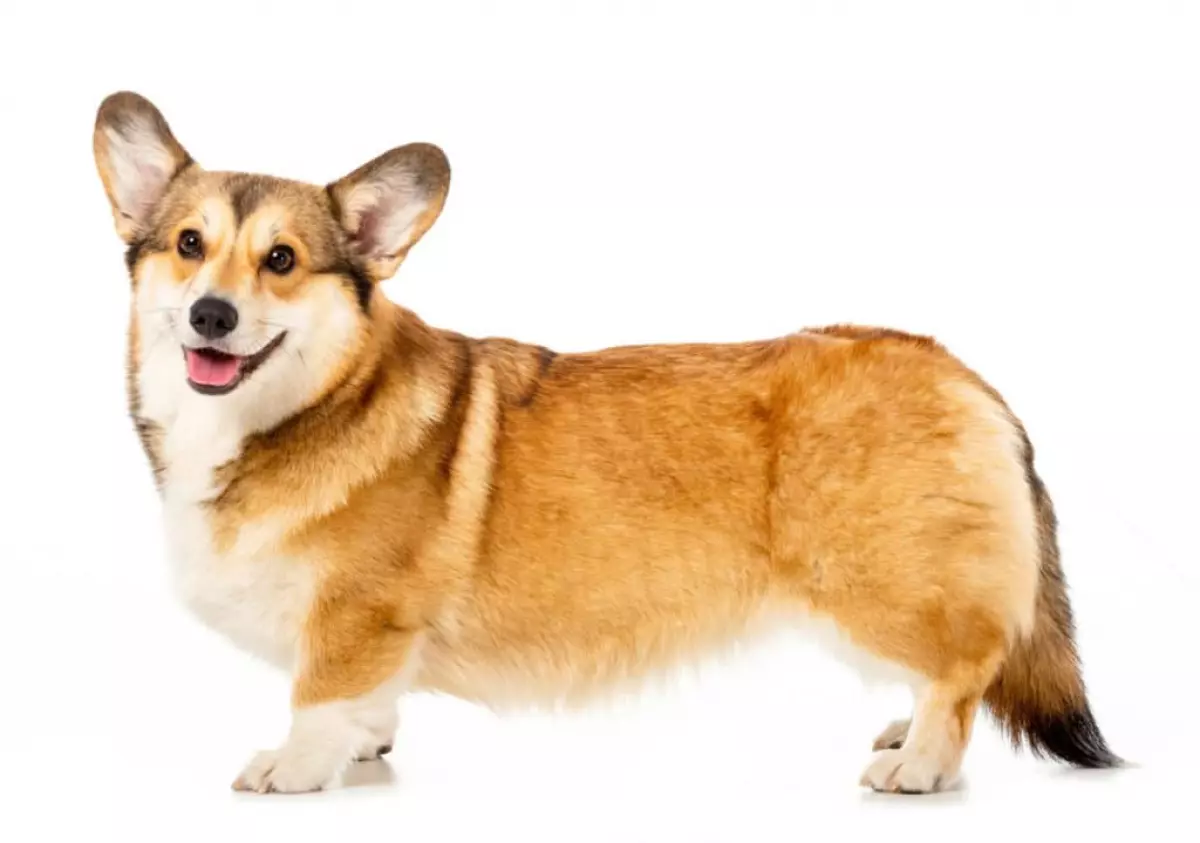To have a Corgi at home is to share your space with a dog that has a larger-than-life personality, despite its small size. This cheerful breed could spend all day playing and is always eager to please its favorite person: you. Owners love how smart and trustworthy their Corgis are, but they must also contend with a dog that’s stubborn, individualistic, and has a mind of its own.
Despite not having the demanding exercise requirements of larger breeds, Corgis need plenty of activity to stay healthy. This herding dog never stops! And besides giving them ample chances to play, owners must keep their minds sharp, too. Corgis require lots of mental stimuli. Fail to provide adequate entertainment, and you may come home to find your house destroyed.
But perhaps the most critical aspect of maintaining your Corgi’s health is choosing the right food to fuel their adventurous personality. Ensuring a proper diet from the time your Corgi is a puppy can significantly affect their quality of life. The best Corgi diet is one that is rich in protein and healthy fats, as well as supplements that will aid digestion and promote joint support.
 Caption: A playful Corgi enjoying a sunny day
Caption: A playful Corgi enjoying a sunny day
5 Key Nutritional Needs of a Corgi
This breed has endless amounts of energy, and your Corgi’s capacity to be on the go at all hours of the day might surprise you. But despite their active lifestyle, they tend to struggle with weight issues. Corgis have a natural tendency to gain weight, which can get problematic, especially when you consider that this dog adores eating. They will eat all day if you let them.
With Corgis, it’s especially vital to find the proper balance of food that will fuel their active lifestyle without making them gain weight. Here are the five key nutritional needs of a Corgi:
Protein
Dogs need the right amount of protein, the foundation for healthy muscles, to sustain lean muscle mass and live their best lives. In general, dogs respond best to protein that comes from animal sources, such as meat, poultry, or fish. Animal protein sources contain all ten of the essential amino acids canines require.
But how much protein should you give your pup? Adult dogs’ food should have a minimum of 18 percent protein (22 percent for puppies), though the sweet spot is somewhere between 24 to 30 percent. And when it comes to Corgis, a higher percentage is better, since they have fast metabolisms and burn calories quickly.
Carbohydrates
There are no specific carbohydrate requirements for dogs, but they do well with easily digestible carb sources such as whole grains, starchy vegetables, legumes, and beans. And it’s better to feed your Corgi a diet that’s less carb-heavy, given their tendency to gain weight. If you’re looking to help your dog slim down, one idea is to find food that’s grain or gluten-free, which contains fewer carbs. We’ve included a food option for Corgi weight loss below if that’s something you’re interested in.
Fats
Fats make up another critical pillar of Corgi nutrition because they provide an easily digestible source of energy, and just like protein, your dog’s fat sources should come from animals. Things like chicken fat (which has fatty acids) or fish oil (which promotes a shiny coat and healthy skin) are ideal. Keep in mind that Corgis may require greater fat levels than other dogs because of their high metabolism.
And when it comes to special fats for puppies, DHA, or docosahexaenoic acid, is an ingredient we recommend. It encourages brain and eye development, and you can find DHA in salmon, sardines, coconut oil, and tuna, or supplement form.
Fruits/Vegetables
Just like for humans, fruits and vegetables are crucial in a canine diet. They provide lots of dietary fiber, as well as loads of necessary vitamins and minerals. You’ll find that many dog foods have fresh vegetables in their recipes, but don’t be afraid to give your dogs fresh fruit and veggies even if their food has some.
Wondering how you should serve it to your Corgi? Do what you would normally do for yourself, and make sure to wash the fruit or vegetable thoroughly, then cut it into manageable sizes. Check before giving it to your dog that the food is safe for them to eat (see below for some that you should avoid), and whether or not you need to remove any seeds.
Prebiotics/Probiotics
You may be surprised to hear that gut health is just as important for dogs as it is for humans. Many dog foods include prebiotics and probiotics, which can benefit your Corgi’s gut diversity and health.
6 Special Dietary and Nutritional Considerations of Corgis
A Corgi’s lifespan is usually anywhere from twelve to fourteen years, which is standard for a breed of its size, and they typically enjoy reasonably good health. Aside from the five key nutritional needs we outlined above, which apply to pretty much all dog breeds, we did want to go over some dietary and nutritional considerations specific to Corgis.
Health issues
This breed is susceptible to several health conditions, some of which include inherited diseases, eye issues, and musculoskeletal problems. We wanted to take note of some of the health problems that relate to a Corgi’s diet or that you can help mitigate with food such as:
- Hip dysplasia: Hip dysplasia is common in dogs, and this is one of the most frequent conditions Corgis suffer from, thanks to its long build and spine. Avoid overfeeding your dog, as being overweight can make this problem worse. You may also want to consider giving your furry friend joint-supporting nutrients like glucosamine and chondroitin, which can help manage symptoms.
- Bloat/gastric torsion: Bloat is typical in deep-chested breeds like Corgis, and it’s a disease that causes the dog’s stomach to dilate and rotate. While it’s a life-threatening condition, the good news is that it’s relatively easy to avoid. Don’t give your dog huge portions, and let him digest for a while before exercising.
Daily calorie intake
The amount of calories your Corgi needs depends on the age of your dog, her weight, and how active she is. As a general guideline, puppies should have about 730 calories per day, and adult dogs need somewhere between 800-900 calories per day. This number may decrease as your dog ages since their activity levels usually decrease as they get older.
Activity level
As a general rule, adult dogs need about 30 calories per pound of body weight if their activity levels are normal. But if they’re highly active, their needs may be closer to about 40 calories per pound of body weight. You should monitor their weight carefully to make sure they are not overeating or undereating.
Allergies
Corgis have no unusually elevated risk for allergies than other breeds, so you may or may not need to feed your dog grain-free products. Unless you know that your dog has an allergy, grain products are fine to start with, though skin issues and recurring ear infections could be a sign that your Corgi suffers from food allergies. If you notice these problems, grains may be to blame, in which case trying a grain-free food could be helpful. Be sure to talk with your vet if you do switch and don’t notice a difference.
Dietary restrictions
There are certain foods that you should never give your Corgi, such as chocolate, raisins, grapes, onions, mushrooms, and cherries. These foods can cause serious health problems like seizures and organ failure, which may lead to an unfortunate untimely ending for your dog. Additionally, avoid feeding your dog too much dairy, which may upset her stomach.
Skin conditions
It’s not uncommon for Corgis to experience skin conditions as a result of their allergies. One way to help them maintain excellent skin health is to make sure they’re getting enough fatty acids in their diet. Look for foods that have omega-3s and omega-6s (supplements work, too), which prevent drying and cracking of the skin. And besides eliminating painful skin problems, fatty acids have the bonus of giving your dog a shinier coat.
Corgi Feeding Schedule
| Age | Weight (lbs.) | Amount of Food per Day (cup) |
|---|---|---|
| Puppy | 20 | ¾ to 1 ½ |
| Adult | 30 | 1/3 to 1/2 |
| Senior | 30 | 1/3 to 1/2 |
Some important things to note with the Corgi breed are that it’s essential that you stick to a consistent feeding schedule. Adult dogs should eat twice per day (morning and night), although puppies may need a third meal. We said above that highly active adult dogs may require more calories per day, so if your Corgi is doing any kind of herding, a third meal may be appropriate.
Overall Best Dog Food for Corgis
Now that you know some basics about Corgi nutrition, it’s time to tell you more about our favorite food options. We’re going to kick things off with our choice for the overall top pick.
Our Top Pick—Merrick Grain-Free
The competition was stiff, but Merrick’s Grain-Free was our favorite dog food of all the products we researched. It’s one of the most popular, highly rated, and trusted dog food brands out there, and it has all of the things Corgis need.
Like a delicious blend of deboned beef, real fruits, and veggies for a hearty flavor. Its limited ingredient list is fortified with antioxidants, as well as omega-3s and omega-6s that will help keep your Corgi’s skin healthy and their fur shiny. And you won’t have to worry about too-large kibble; the size of this food is perfect for small Corgi mouths.
Merrick also included glucosamine and chondroitin in the recipe, which we consider essential supplements to keep your Corgi’s bones healthy, especially considering their predisposition for back issues. And the best thing of all is that Merrick uses human-grade food in their recipes. If something is unsafe for us to eat, why should we feed it to our pets?
10 More Top-Rated Dog Foods for Corgis
We also chose ten other top-rated dog foods that can address specific issues your Corgi might have, such as food for puppies and seniors, overweight Corgis, and pups with sensitive stomachs.
- Runner-up—Wellness CORE Grain-Free Dry Dog Food: This high-protein and grain-free recipe is made with real deboned turkey, turkey meal, and chicken meal. Glucosamine and chondroitin help maintain bone and joint health to support mobility.
- Fresh/Super Premium—NomNom Fresh Food Delivery: Fresh, human-grade ingredients with added vitamins and powerful antioxidants from real fruits and vegetables.
- Most Popular—Taste of the Wild High Prairie Grain-Free Dry Dog Food: Grain-free recipe made with real buffalo as the first ingredient followed by other real protein-rich ingredients including bison, roasted venison, and beef for lean nutrition and to help support strong muscles. Natural recipe with added vitamins and powerful antioxidants from real fruits and vegetables support overall health, while omega-3 and omega-6 fatty acids support healthy skin and coat.
And more...
For detailed information on all the top-rated dog foods for Corgis, including pricing and specific features, check out our full article!
Our 2023 Corgi Feeding Guide
When should I switch my Corgi puppy to adult food?
Young dogs are considered puppies until roughly about the age of one. You should begin transitioning them from puppy food to adult food gradually when your dog is between twelve and fourteen months of age. The best way to make this transition is by mixing their new food into the puppy food little by little. As they get used to it, you can add more and more until they are only eating adult food.
Do Corgis need calcium supplements?
The short answer is no. Industry guidelines dictate how much calcium dog food manufacturers should fortify their products with, which they must balance carefully against phosphorus. As long as you’re choosing high-quality foods from respected brands, there’s no real need to supplement with calcium. However, if you’re concerned that your Corgi isn’t getting enough calcium in her diet, don’t hesitate to raise this concern with your vet.
Is fresh or dry food better for my Corgi?
This is a common question from pet owners, and there’s no cut and dry answer. What’s most important is making sure your Corgi gets all the nutrients she needs. To do this, you should be paying attention to make sure that the food is high quality, made from natural ingredients, and that your dog is getting the right amount of calories for her age and activity level.
Though we can’t say that one type of food is inherently better than the other, fresh food would be our top recommendation. It typically provides the highest nutritional value and is easy to digest, but the main disadvantage of fresh food is that it comes with a hefty price tag. Many dog parents opt for kibble, which is easy to serve and cost-efficient and also helps clean your dog’s teeth.
If you want to reap the benefits of fresh food without spending as much, you can mix in some of the fresh or wet food with your dog’s kibble.
What kind of vegetables should Corgis eat?
We mentioned above that it’s a good idea to supplement your Corgi’s diet with fresh vegetables. You can do so by mixing them into whatever high-quality food you’re already giving your dog or serve it as a snack. Some excellent options are broccoli, carrots, cucumber, asparagus, zucchini, sweet potato, spinach, and peas.
 Caption: A happy Corgi enjoying a walk in nature
Caption: A happy Corgi enjoying a walk in nature
Conclusion
Corgi owners must be aware of the unique nutritional needs of their dogs because their furry friends deserve the very best food to fuel many years of playtime, walks, and love. The main concern for Corgis is providing a nutritionally rich diet without overfeeding them, which can lead to serious health issues.
We know that there’s a lot to consider when preparing for the arrival of your new best friend, and the topic of nutrition alone can feel overwhelming. We hope you found this guide to the best Corgi foods helpful, and you can rest assured that all of the products on this list are of the very best quality. No matter which one you choose, they will keep your Corgi happy and healthy.
Note: This article is for informational purposes only and should not replace professional veterinary advice. Always consult with a veterinarian for specific dietary recommendations for your Corgi.

















